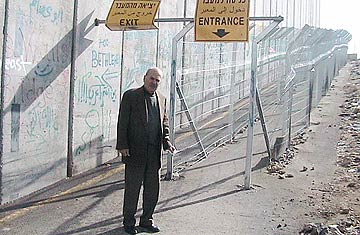
TIME correspondent Jamil Hamad passes through the Israeli checkpoint between his home in Bethlehem and the TIME office in Jerusalem.
It's a pretty sentiment, suitable for the birthplace of Jesus Christ. The sign, put up by the Israeli Tourism Ministry, may be written in Arabic script, but its message of peace is clearly not meant for Arabs — not for me, not for the hundreds of Palestinian laborers, school kids, businessmen, teachers, people going to see doctors, who must run the daily gauntlet of Israeli security checks. A tourist who wants to go from Bethlehem to Jerusalem can make the journey by car in 15 minutes. I must go on foot and, depending on the mood of the young Israeli soldiers at the checkpoint, the trip can take an hour, two, three. Or sometimes, if there's a security alert, they simply close down the checkpoint to all Palestinians. Peace Be With You.
It's humiliating, and hard not to interpret this as a collective punishment against Palestinians. First, I walk into a long, wire mesh cage that runs along a 20-ft.-high concrete wall which, on the Palestinian side, is smeared with graffiti. On the wall, someone has painted a big pair of scissors as if to say: Cut along the dotted Line. If only it were that easy.
Then comes the Striptease, the long conveyor belt where you have to put all your belongings before going through the security check. Some days they make me take off my jacket, other days, my shoes or my belt. It's very frustrating, especially when you get behind a woman with lots of earrings and bracelets who doesn't know how the machine works — and there are hundreds of people pushing and shoving behind you. I've seen sick people desperate to reach a doctor, or people screaming because they're going to miss their airplane or connection to Jordan, but no matter how hard they shout, it never does any good.
After that, you have to show your ID and magnetic pass. There are five windows, but only one is ever open, no matter how many Palestinians are trying to cross through. The U.S. embassy people who perform periodic checks to make sure things are running smoothly at these checkpoints should really make surprise visits. Usually, the Israelis know beforehand that the Americans are scheduled for inspection. We can tell because that's when the soldiers open all the gates. But most of the time, there's only one soldier, and you have to be very patient and pretend to be sympathetic while he or she is on the cellphone for 10 minutes talking to a friend or a mother. Otherwise, if you try to hurry along the soldier in the booth, it puts him or her in a bad mood, and it can take a lot longer.
An Israeli general once told me, "Jamil, these checkpoints are nothing but an invitation for the terrorists to try another way." In fact, in all the years of crossing, I've never seen the Israelis catch a terrorist or a suicide bomber at the Bethlehem checkpoint. So what is the security value of this exercise?
Instead, the checkpoints have turned into places of humiliation by Israeli soldiers who are always shouting, and who assume that every Arab speaks Hebrew. We don't. So how can I understand it when the girl soldier is shouting at me so angrily?
Most Israeli soldiers don't speak Arabic, so they don't understand what the Palestinians are saying in line. I hear those voices. They think this process is a worthless humiliation. And they want to take revenge against the Israelis. How? By voting for their enemies, for the two Islamic resistance groups, Hamas and Islamic Jihad. This is how the Arab mind works: you are stronger, and you humiliate me. I'm weak. I don't have planes or missiles, but I do have the vote, and that's how I take revenge. I vote for your enemy.
If the Israelis consider every Palestinian, from a child to an old woman, to be a terrorist, then the Israelis have a problem that's not going to be solved by walls and security checks. Not all Palestinians are hostile to Israel. Most are interested in a peaceful life, in raising their children. A few believe in violence, but Israel can't punish all Palestinians just because of a few. At the same time, Palestinians shouldn't generalize about all Israelis based on a few settlers and extremists. But with these punishments at the checkpoints, it's very difficult. We feel humiliated. When I see that sign "Peace Be With You," I wonder: What kind of peace can this be?
